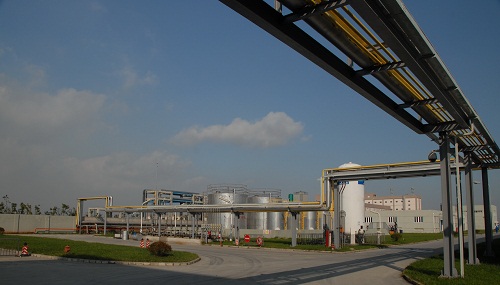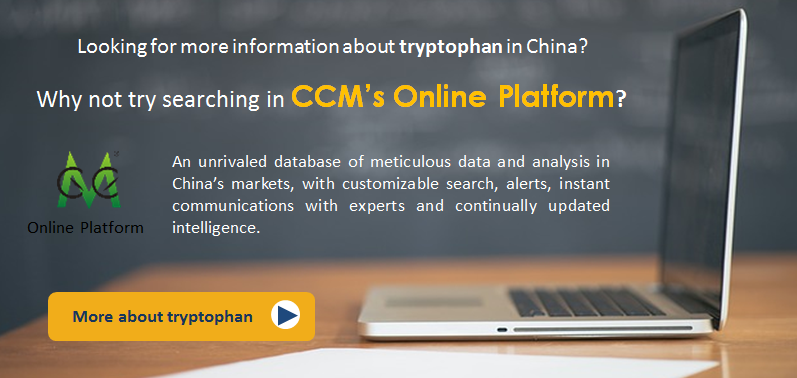Henan Julong succeeded in developing new
production technique of 4-HIL. Meanwhile, the company intended to expand its
L-tryptophan business, which also put itself under the risk from downturn in tryptophan market price.

Source: Baidu
On 7 March, 2016, Henan Julong Bioengineering Co.,
Ltd. (Henan Julong) made an announcement about its success in developing new
production technique of 4-hydroxy-L-isoleucine (4-HIL). This new technical
produces 4-HIL by biological fermentation. To be specific, entner-doudoroff and
pentose phosphate oxidize and inactivate the enzymes in the branched chain,
which largely improves the conversion rate of L-isoleucine and makes it
possible to mass produce high purity 4-HIL. Notably, Henan Julong is the first enterprise
to produce 4-HIL by biological fermentation globally. 4-HIL, a new
insulinotropic agent, can be used for the treatment of diabetes mellitus Type
II and the regulation of blood lipids.
Henan Julong is China's leading amino acid manufacturer. Its products include
L-tryptophan, L-threonine and food-grade L-leucine. Particularly, it is the
largest tryptophan producer in China with the capacity of 7,000 t/a in 2015,
accounted for 17% of the global sales.

Moreover, Henan Hongda Bio-Pharmaceutical Co., Ltd., the company's wholly-owned
subsidiary, obtained the Drug Production Certificate on 1 March, 2016, laying
the foundation for its extension to the biological medicine business. Besides,
on 8 Nov., 2015, Henan Julong set up another wholly-owned subsidiary, Henan
Julong Biotechnology Co., Ltd., for its expansion in L-tryptophan business.
The increasing demand pushed Henan Julong to expand its L-tryptophan business.
According to CCM's research, in 2015, China's output of tryptophan reached
12,000 tonnes, up by 9% YoY. Particularly, domestic consumption rose by 9%,
while the export increased by 13%. However, the company will also face the risk
from downturn in market price of tryptophan. According to CCM's price
monitoring, China's overall market price of tryptophan has continued sliding
since 2015. In Feb. 2016, the market price of 98% tryptophan fell to
USD8,086.79/t (RMB53,000/t), sharply down by 53.37% YoY.
Monthly
market price of 98% tryptophan in China, Jan. 2014-March 2016

Source: CCM
The low market price of tryptophan was caused by:
1. Fall in purchase price of raw material
Due to the huge stock of corn in China, the purchase price of corn kept
decreasing. For instance, Henan Julong uses corn as the basic raw material to produce
tryptophan. According to data from Henan Julong, its purchase price of corn was
USD261.52/t (RMB1,710/t) on 14 March, down by 9.94%, compared with USD287.53/t
(RMB1,880/t) in the first business day in 2016.
2. Competition from soybean meal
The market price of soybean meal, a substitute for tryptophan, continued going
down. China’s import of soybean increased greatly. Thus, with sufficient supply
of raw material, the price of soybean meal declined sharply. According to CCM’s
price monitoring, the market price of soybean meal was USD389.99/t (RMB2,550/t)
in Feb. 2016, down by 19.59% YoY. Soybean meal contains around 0.6% of
tryptophan. Therefore, breeding enterprises prefer the cheaper soybean meal to
tryptophan to reduce cost.
Monthly market price of 43% soybean meal in China,
Jan. 2014-Feb. 2016

Source: CCM

About CCM:
CCM is the leading market intelligence
provider for China’s agriculture, chemicals, food & ingredients and life
science markets. Founded in 2001, CCM offers a range of data and content
solutions, from price and trade data to industry newsletters and customized
market research reports. Our clients include Monsanto, DuPont, Shell, Bayer,
and Syngenta. CCM is a brand of Kcomber Inc.
For more information about CCM, please
visit www.cnchemicals.com or
get in touch with us directly by emailing econtact@cnchemicals.com or
calling +86-20-37616606.
Tag: tryptophan